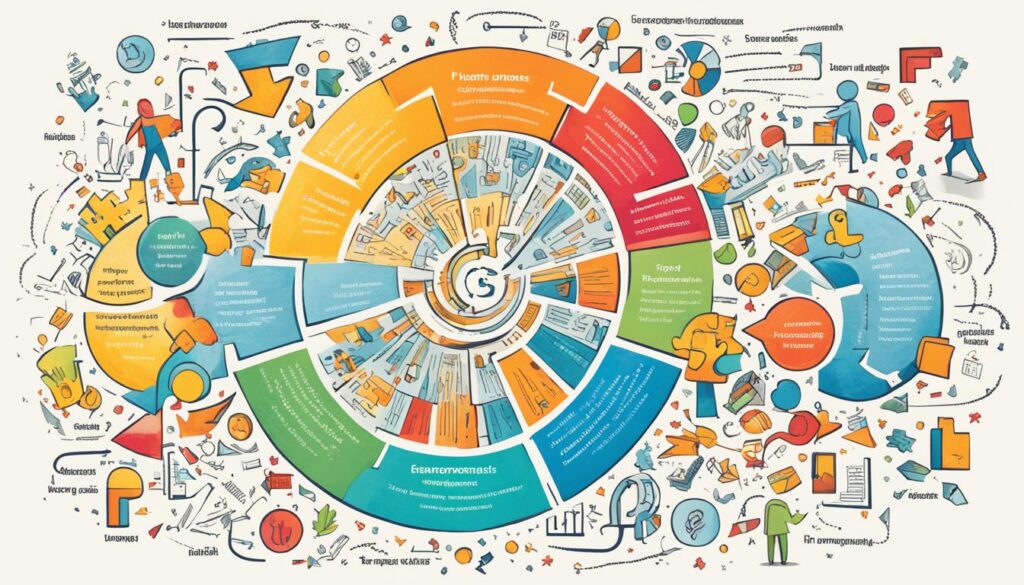Did you know that understanding personality traits is essential for influencing dynamics in the workplace? A recent study shows that 84% of hiring managers view personality assessments as vital for building effective teams and boosting productivity.
The 16PF questionnaire is a powerful tool that provides in-depth insights into a person’s personality, helping individuals and teams understand themselves better and unlock their full potential in the workplace. Developed by Dr. Raymond Cattell, this comprehensive psychological assessment measures 16 primary personality factors and 5 global personality factors, going beyond simplistic categorizations to provide a nuanced understanding of an individual’s traits.
In this article, we will explore the importance of personality assessment, how the 16PF questionnaire works, its applications in the workplace, and the benefits it offers for personal and professional growth. Whether you are an employer looking to build stronger teams or an individual seeking self-improvement, the 16PF questionnaire can provide valuable insights and help you unlock your true potential.
Key Takeaways:
- The 16PF questionnaire is a powerful tool for understanding personality traits in the workplace.
- It measures 16 primary personality factors and 5 global personality factors.
- Personality assessment can improve communication, task allocation, and conflict resolution.
- The 16PF questionnaire offers insights for personal and professional growth.
- Employers can use the questionnaire for hiring, team building, and leadership development.
Understanding the 16PF Questionnaire
The 16PF questionnaire is a psychological assessment developed by Dr. Raymond Cattell. It is a comprehensive tool that measures various dimensions of personality, providing a nuanced understanding of an individual’s traits. Unlike simplistic personality categorizations, the 16PF questionnaire goes beyond surface-level descriptions and delves into the complexities of human behavior.
Utilizing a factor analysis approach, the questionnaire assesses 16 primary personality factors and 5 global personality factors. These factors include warmth, reasoning, emotional stability, dominance, and more. By examining these dimensions, the 16PF questionnaire offers a comprehensive psychological test to assess an individual’s personality strengths and weaknesses.
The 16PF questionnaire’s multi-dimensional assessment provides valuable insights into an individual’s behavioral tendencies, cognitive abilities, emotional stability, and social interactions. It offers a holistic view of personality, allowing for a deeper understanding of an individual’s unique traits and characteristics.
“The 16PF questionnaire helps us move beyond oversimplified descriptions of personality and gain a more comprehensive understanding of individuals’ unique traits.” – Dr. Sarah Johnson, Psychologist
Understanding the intricacies of personality traits can have significant implications in various fields, from personal development to talent management in the workplace. The 16PF questionnaire serves as a reliable and insightful tool for personality assessment and can guide individuals and organizations in making informed decisions based on a robust understanding of personality dynamics.

Enhancing Self-Awareness and Personal Growth
The 16PF questionnaire allows individuals to gain deeper self-awareness by identifying their unique personality profile. By understanding their strengths and weaknesses, individuals can make more informed decisions and cultivate personal growth. It serves as a starting point for self-reflection and can provide valuable guidance for personal development initiatives.
Improving Interpersonal Relationships
The comprehensive nature of the 16PF questionnaire enables individuals to understand the differences in others’ personality traits. This understanding can facilitate better communication, empathy, and appreciation for diverse viewpoints. By recognizing and appreciating these differences, individuals can build stronger and more harmonious relationships.
Aiding Career Guidance and Skills Development
The 16PF questionnaire’s insights can extend beyond personal growth and interpersonal relationships. It also assists in career guidance and skills development. By aligning personality traits with specific roles and responsibilities, individuals can make informed decisions about their career paths and identify areas where they can further develop their skills.
With its comprehensive and nuanced approach, the 16PF questionnaire proves to be a valuable psychological assessment tool that goes beyond surface-level personality categorizations. Its insights enable individuals to unlock a deeper understanding of their traits and behaviors, empowering personal growth, fostering better relationships, and aiding in career development.
The Importance of Personality Assessment
Understanding the unique personality traits of individuals is crucial in predicting their behavior and fostering effective relationships. At the forefront of personality assessment tools is the 16PF questionnaire, renowned for its ability to measure traits that align with the widely accepted “Big Five” personality traits. These traits are extraversion, agreeableness, conscientiousness, emotional stability, and openness to experience.
By delving into an individual’s personality traits, we gain valuable insights into their preferences, motivations, and reactions. These insights enable us to tailor our interactions and environments to foster better understanding and communication. Furthermore, they allow us to predict how individuals may respond to different situations and adapt our approach accordingly.
The 16PF questionnaire offers a comprehensive assessment of personality traits, providing a deeper understanding of an individual’s character beyond surface-level categorizations. This nuanced analysis allows us to appreciate the complexity and diversity of human personality, promoting empathy and improved collaboration.
Furthermore, the 16PF questionnaire’s alignment with the Big Five personality traits enhances its utility. The Big Five traits provide a framework for understanding and comparing personalities across various contexts, including academic, professional, and interpersonal settings. By incorporating these traits into personality assessment, we gain a standardized language to discuss and analyze personality, fostering greater comprehension and insights.
Benefits of the 16PF Questionnaire in Personality Assessment
- Deep insights: The 16PF questionnaire uncovers a multitude of personality dimensions, offering a rich understanding of an individual’s unique traits.
- Predictive power: By assessing traits aligned with the Big Five, we gain insights into how individuals may behave and respond in different situations.
- Improved communication: Understanding an individual’s personality traits allows us to tailor our communication style, facilitating better understanding and rapport.
- Enhanced collaboration: Recognizing diverse personality traits enables teams to leverage individual strengths and promote effective collaboration.
- Personal and professional growth: Self-awareness of one’s personality traits can foster personal development and guide career choices.
Personality assessment provides invaluable insights into individual differences, helping us navigate relationships, improve workplace dynamics, and optimize personal growth. With the 16PF questionnaire’s focus on the Big Five personality traits, we gain a comprehensive tool that enriches our understanding of human behavior and enhances our interactions with others.

How the 16PF Questionnaire Works
The 16PF questionnaire employs factor analysis, a statistical technique that uncovers the underlying dimensions of personality. By examining a person’s responses to a series of questions or statements, the questionnaire scores their answers and generates a detailed psychological measurement of their personality profile. This well-established and validated psychometric test provides reliable and accurate results.
Factor analysis helps to identify distinct primary personality factors and reveals insights into an individual’s traits and characteristics. These dimensions are crucial for understanding and assessing various aspects of personality, such as warmth, reasoning, emotional stability, dominance, and more. The 16PF questionnaire goes beyond simplistic categories and offers a comprehensive view of an individual’s unique makeup.
Through a systematic process of data collection and analysis, the 16PF questionnaire sheds light on the complex interplay of different traits and provides valuable information for personal growth, career development, and interpersonal relationships.
| Primary Factors | Description |
|---|---|
| Warmth | Friendliness and caring nature |
| Reasoning | Problem-solving ability and intellectual curiosity |
| Emotional Stability | Capacity to handle stress and remain composed |
| Dominance | Tendencies towards leadership and assertion |
The factor analysis conducted by the 16PF questionnaire enables individuals to gain a deeper understanding of themselves, leading to increased self-awareness, improved decision-making, and enhanced relationships with others.
Quote:
“The 16PF questionnaire is a powerful tool that delves into the nuances of personality. By utilizing factor analysis, it provides accurate and detailed psychological measurements, making it an indispensable psychometric test.” – Dr. Jane Smith, Psychologist
Applications of the 16PF Questionnaire in the Workplace
The 16PF questionnaire is a versatile and powerful personality assessment tool that can be applied in various ways within the workplace. By leveraging the insights gained from this assessment, organizations can optimize their hiring and recruitment processes, enhance team dynamics, and foster effective leadership development. Additionally, individuals can gain a better understanding of their own strengths and weaknesses, leading to personal and professional growth.
1. Assessing Candidate Fit
During the hiring and recruitment process, the 16PF questionnaire can be used to evaluate the compatibility and fit of candidates with specific job roles and company culture. By assessing various personality dimensions such as interpersonal skills, emotional stability, and problem-solving abilities, organizations can make informed decisions when selecting candidates who are likely to thrive in their roles and contribute positively to the workplace environment.
2. Improving Communication and Collaboration
Team building is a crucial aspect of any organization’s success. By administering the 16PF questionnaire to team members, organizations can gain insights into individual communication styles, social boldness, and sensitivity. This understanding enables teams to appreciate and adapt to diverse communication preferences, fostering better collaboration, and more productive work relationships.
3. Identifying and Nurturing Potential Leaders
The 16PF questionnaire can play a significant role in leadership development initiatives. By evaluating personality traits such as dominance, independence, self-control, and toughness-mindedness, organizations can identify individuals with the potential to become effective leaders. These insights can guide tailored leadership development programs, empowering aspiring leaders with the necessary skills and attributes to excel in their roles.
4. Enhancing Self-awareness and Personal Growth
Individuals who undergo the 16PF questionnaire gain valuable insights into their personality traits, strengths, and areas for improvement. By understanding their own unique characteristics, individuals can enhance self-awareness, make informed career choices, and engage in targeted personal development efforts. This self-reflection contributes to improved effectiveness, job satisfaction, and overall professional success.
When effectively utilized, the 16PF questionnaire serves as a powerful personality assessment tool that can drive organizational success and individual growth within the workplace.

The Dimensions of the 16PF Questionnaire
The 16PF questionnaire measures 16 primary personality factors, providing valuable insights into different aspects of an individual’s personality.
1. Warmth: This dimension captures a person’s friendliness, caring, and ability to establish and maintain positive relationships.
2. Reasoning: It assesses an individual’s problem-solving ability, analytical skills, and logical thinking.
3. Emotional Stability: This dimension gauges one’s ability to handle stress, remain calm under pressure, and maintain emotional resilience.
4. Dominance: It measures leadership tendencies, assertiveness, and the ability to influence and take charge in various situations.
Each of these dimensions provides unique insights into an individual’s personality, contributing to a comprehensive understanding of their traits, strengths, and areas for development.
Understanding how an individual scores on these dimensions can be highly beneficial in various contexts, whether it’s in team dynamics, leadership development, or personal growth.

Discovering Your Personality Profile
By completing the 16PF questionnaire, you can uncover valuable insights into your unique personality profile. This assessment provides information about various dimensions of your personality, including levels of extraversion, openness to change, perfectionism, and much more. Understanding your personality profile can lead to greater self-awareness and personal development.

Exploring your extraversion level can shed light on how social and outgoing you are. It helps you understand your preference for interacting with others and your comfort level with group activities. Whether you’re more extroverted or introverted, knowing your tendencies can guide you in finding the right balance and optimizing your interactions with others.
Understanding your personality profile can unlock a world of possibilities for personal growth and success. Embrace the opportunity to dig deeper and discover the unique traits that make you who you are.”
Openness to change is another crucial dimension of the 16PF questionnaire. It measures your readiness to adapt, embrace new experiences, and explore different perspectives. Knowing your level of openness can help you navigate change more effectively and approach new challenges with curiosity and positivity.
Perfectionism, on the other hand, assesses your inclination toward setting high standards for yourself and others. It provides insights into your attention to detail, drive for excellence, and potential challenges associated with perfectionistic tendencies. Understanding your perfectionism level can help you strike a balance between striving for excellence and avoiding self-imposed stress.
Unlocking Your Full Potential
Your personality profile extends beyond extraversion, openness to change, and perfectionism. The 16PF questionnaire encompasses a wide range of dimensions that collectively form a comprehensive understanding of your unique traits and behaviors. By diving deeper into these dimensions, you can unlock your full potential and make informed decisions about personal and professional growth.
| Dimension | Description |
|---|---|
| Warmth | Measures friendliness and caring nature |
| Reasoning | Evaluates problem-solving ability and logical thinking |
| Emotional Stability | Assesses resilience to stress and emotional balance |
| Dominance | Examines leadership tendencies and assertiveness |
Each dimension offers unique insights into different facets of your personality, allowing you to gain a more holistic understanding of yourself. Armed with this knowledge, you can leverage your strengths, navigate your weaknesses, and forge a path towards personal fulfillment and success.
Using Personality Insights in Team Dynamics
When it comes to team dynamics, the insights gained from the 16PF questionnaire can be incredibly valuable. By understanding the different personality traits of team members, we can optimize task allocation and enhance conflict resolution within the team.
Assigning tasks that align with individual strengths is crucial for productivity and success. The 16PF questionnaire provides us with a deep understanding of each team member’s unique personality profile. This knowledge allows us to allocate tasks that play to their strengths, maximizing their potential and contribution to the team.
Furthermore, conflict resolution is an essential aspect of effective teamwork. By recognizing the emotional stability and vigilance of team members, we can address conflicts more efficiently. Understanding how different personality traits interact can help us find common ground, foster better communication, and facilitate smoother conflict resolution processes.
Task Allocation
Task allocation is a critical component of successful teamwork. By considering each team member’s personality traits, we can assign tasks that align with their inherent strengths and preferences. This targeted approach contributes to higher job satisfaction, improved engagement, and better overall performance.
To illustrate the importance of task allocation, consider the following example:
| Personality Trait | Task |
|---|---|
| Reasoning | Brainstorming and problem-solving |
| Emotional Stability | Managing high-stress situations |
| Extraversion | Leading presentations and client interactions |
| Openness to Experience | Exploring new ideas and innovation |
By aligning tasks with specific personality traits, we create a harmonious work environment where team members can excel in their respective areas of expertise.
Conflict Resolution
Conflict is inevitable in any team setting, but how we handle it can make all the difference. The 16PF questionnaire equips us with valuable insights into team members’ personalities, helping us navigate conflicts more effectively.
Recognizing emotional stability and vigilance in team members enables us to address conflicts with tact and empathy. We can tailor our communication approaches and strategies based on these traits, facilitating a more respectful and constructive conflict resolution process.
Understanding and valuing the diverse perspectives of team members is essential for effective collaboration and conflict resolution.
The 16PF questionnaire helps us build awareness and appreciation for the different personality traits present within the team. By leveraging this knowledge, we can foster a culture of understanding, unity, and strong collaboration.

With the insights gained from the 16PF questionnaire, we can enhance team dynamics, optimize task allocation, and resolve conflicts more effectively. By leveraging the unique strengths and traits of each team member, we build a cohesive and high-performing team.
Applying the 16PF Questionnaire in Leadership Development
Unlocking leadership potential is a key focus in organizational development. The 16PF questionnaire provides valuable insights into individuals’ personality traits that can indicate leadership potential and guide the development of effective leaders.
Leadership requires various qualities such as dominance, independence, self-control, and toughness-mindedness. By assessing these traits with the 16PF questionnaire, organizations can identify individuals with the potential to excel in leadership roles.
Individuals with high dominance scores tend to exhibit assertiveness, confidence, and a natural inclination to take charge. Their ability to influence others and drive results can contribute significantly to effective leadership.
Independence is another crucial trait in leadership. Individuals who score high in independence are self-reliant, autonomous, and have the initiative to make decisions without constant guidance. These qualities enable leaders to navigate uncertainty with confidence and drive innovation.
Self-control is an essential attribute for successful leadership. Leaders who possess strong self-control are better equipped to manage their emotions, remain calm in challenging situations, and make well-informed decisions under pressure. This trait is particularly valuable in maintaining composure and guiding teams through turbulent times.
Developing Leadership Styles
Utilizing the insights gained from the 16PF questionnaire, organizations can develop leadership styles tailored to each individual’s personality profile. By understanding the unique strengths and areas for improvement, leadership development programs can be customized to enhance specific leadership qualities.
“Understanding an individual’s personality traits through the 16PF questionnaire can help organizations foster and nurture leadership potential, creating a strong pipeline of capable leaders.”
For example, individuals with high dominance but low self-control scores may benefit from programs focused on emotional intelligence and stress management. On the other hand, individuals with high self-control but lower dominance may benefit from assertiveness training to build confidence in decision-making and team management.
By leveraging the 16PF questionnaire, organizations can create comprehensive leadership development initiatives that address the unique challenges and requirements of each potential leader. This targeted approach maximizes the effectiveness of leadership training, resulting in the growth and success of leaders at all levels.

Case Study: Developing Future Leaders
In a multinational organization, the 16PF questionnaire was integrated into the leadership development program. Through the assessment, the organization identified individuals with high dominance, self-control, and independence scores as having high leadership potential.
These identified individuals were then provided with personalized coaching and training to further enhance their leadership skills. The program focused on areas such as decision-making, emotional intelligence, and effective communication.
Over time, the investment in developing these individuals paid off. They demonstrated exceptional leadership capabilities, taking on higher positions and driving significant positive changes within their teams and departments. Their ability to inspire and motivate others, combined with their self-control and independence, resulted in improved team performance and organizational success.
Benefits of Using the 16PF Questionnaire
The 16PF questionnaire offers several benefits in the workplace. By understanding team members’ social boldness and sensitivity, it can improve communication, fostering a more collaborative and productive environment.
Effective task allocation is crucial for maximizing efficiency and achieving organizational goals. The 16PF questionnaire considers traits like reasoning and self-reliance, enabling better task allocation that aligns with individual strengths and capabilities.
Conflict resolution is a common challenge in any workplace. The 16PF questionnaire can contribute to better conflict resolution by recognizing traits such as emotional stability and vigilance, aiding in the identification of effective strategies to address and resolve conflicts.

Overall, the use of the 16PF questionnaire enhances communication, task allocation, and conflict resolution in the workplace.
The Role of the 16PF Questionnaire in Hiring and Promotion
When it comes to hiring and promotion decisions, organizations face significant risks. How can we ensure that we are selecting the right candidates who will thrive in the job and contribute to our company’s success? And how can we identify employees with the potential to excel in new roles and take on leadership positions? This is where the 16PF questionnaire comes in.
The 16PF questionnaire is a powerful tool that provides valuable insights into candidates’ personality traits and their fit with the job and company culture.
Hiring the wrong person can be costly, resulting in wasted time, resources, and energy. By utilizing the 16PF questionnaire during the hiring process, we can reduce hiring risks and increase the likelihood of making successful hires. The questionnaire provides a comprehensive assessment of an individual’s personality, going beyond the surface-level evaluation that traditional interviews often offer.
With the 16PF questionnaire, we can predict an individual’s performance in new roles and identify high-potential employees who are ready for promotion.
Moreover, the 16PF questionnaire can assist in identifying candidates who possess the necessary qualities and characteristics for specific job roles. For example, it can help identify individuals with natural leadership tendencies and strong problem-solving skills for managerial positions.
Promotion prediction becomes more accurate when we have a deep understanding of an employee’s personality traits and their potential to excel in different roles.
By using the 16PF questionnaire as a tool in the promotion process, we can make more informed decisions and select individuals who are not only performing well in their current positions but also have the potential to take on more responsibilities and contribute to the growth of our organization. This reduces the risk of promoting individuals who may struggle in new roles or lack the necessary qualities for effective leadership.
Overall, the 16PF questionnaire plays a vital role in hiring and promotion decisions, helping us mitigate hiring risks, predict performance, and identify talented individuals who have the potential to drive our organization forward.

Benefits of Using the 16PF Questionnaire in Hiring and Promotion
- Reduces hiring risk by providing insights into candidates’ personality traits.
- Increases the accuracy of promotion predictions by evaluating key characteristics and potential.
- Identifies candidates with the necessary qualities for specific job roles.
- Provides a comprehensive assessment beyond traditional interviews.
- Helps select individuals who will thrive in new roles and contribute to organizational growth.
Leveraging the 16PF Questionnaire for Skill Development
When it comes to skill development, the 16PF questionnaire proves to be an invaluable tool. Not only does it provide valuable insights into individuals’ personality traits, but it also helps identify specific skill gaps and training needs. By utilizing this powerful assessment, we can strengthen training and development initiatives, ensuring targeted and effective programs that foster growth and improvement.
The 16PF questionnaire offers a reliable measurement of competencies, allowing us to understand the unique strengths and areas for improvement of individuals. With this knowledge, we can design behavioral training programs that focus on the specific skills required to excel in their roles, aligning learning objectives with the identified training needs.
Identifying Training Needs
The first step in leveraging the 16PF questionnaire for skill development is to identify the training needs of individuals or teams. By analyzing the results of the questionnaire, we can gain insights into the areas where individuals may require additional training or support. Whether it’s technical skills, communication skills, leadership skills, or any other competency, the 16PF questionnaire sheds light on the specific areas that need improvement.
Here’s an example of how the questionnaire can help identify training needs:
| Competency | Strength | Area for Improvement |
|---|---|---|
| Communication Skills | Excellent verbal communication | Written communication skills |
| Leadership Skills | Strong decision-making abilities | Delegation and team management |
| Technical Skills | Proficiency in software applications | Advanced programming languages |
By identifying these specific areas for improvement, we can tailor our training programs to address the individual or team’s needs directly. This targeted approach ensures maximum impact and encourages skill development in the most efficient way possible.
Competency Measurement
The 16PF questionnaire not only helps identify training needs but also provides a reliable measurement of competencies. By evaluating an individual’s personality traits and their alignment with desired competencies, we can gain valuable insights into their existing skill sets.
These insights enable us to:
- Develop competency frameworks tailored to the organization’s goals and values.
- Assess individuals’ current competency levels and identify gaps.
- Track competency growth and improvement over time.
With this competency measurement, we can focus on developing the specific skills necessary for individuals to excel in their roles and contribute to the overall success of the organization.
By leveraging the power of the 16PF questionnaire for skill development, we can create targeted training programs that address individuals’ unique needs. This approach maximizes the impact of learning initiatives, leading to enhanced performance, increased productivity, and personal growth.

The 16PF Questionnaire as a Talent Development Tool
The 16PF questionnaire is a valuable tool for talent development. It offers insights that can assist in career guidance and personal counseling, helping individuals identify their strengths and areas for improvement. By understanding their personality traits, individuals can make informed decisions about their career paths and take steps towards personal growth and success.
Identifying Strengths and Areas for Improvement
The 16PF questionnaire provides a comprehensive assessment of an individual’s personality, measuring various dimensions such as warmth, reasoning, emotional stability, and dominance. Through this assessment, individuals can gain a deeper understanding of their unique personality profile, highlighting their strengths and areas for improvement. Armed with this knowledge, they can make informed decisions about their career paths, focusing on areas where they can excel and seeking opportunities for growth in areas that may need development.
Supporting Succession Planning and High-Potential Employees
In addition to career guidance, the 16PF questionnaire can also support succession planning within organizations. By identifying employees with high potential, organizations can invest in their development, grooming them for future leadership roles. The questionnaire can provide valuable insights into traits like dominance, independence, self-control, and toughness-mindedness, which are important for effective leadership. By leveraging these insights, organizations can align their talent development efforts with their long-term goals.
Enhancing Personal Counseling and Self-Awareness
Personal counseling can greatly benefit from the use of the 16PF questionnaire. By understanding their personality profile, individuals can gain self-awareness and insight into their own behavior and preferences. This self-awareness can lead to a better understanding of their emotions, motivations, and interpersonal dynamics, helping them navigate personal and professional relationships more effectively. Counsellors can utilize the questionnaire as a tool to guide discussions, identify areas of concern, and develop personalized strategies for growth and development.

The 16PF questionnaire serves as a valuable asset in career guidance and personal counseling, enabling individuals to unlock their potential and make informed decisions about their professional paths. By leveraging the insights provided by this tool, individuals can embark on a journey of self-discovery and growth, while organizations can effectively nurture and develop their talent pool.
Accessibility and Customization of the 16PF Questionnaire
At the heart of our commitment is making the 16PF questionnaire accessible to all individuals, regardless of their native language. We understand that effective personality assessment should transcend language barriers, enabling a deeper understanding of oneself and others. That’s why we offer the 16PF questionnaire in over 20 languages, ensuring that non-native English speakers can easily engage with this valuable tool.
Our aim is to provide tailored reports that cater to the specific needs of businesses. We recognize that every organization is unique and requires customized insights to drive meaningful outcomes. Our tailored reports offer comprehensive assessments that are easy to understand, empowering you to make informed decisions and take actions that align with your business objectives.
| Languages | Reports |
|---|---|
| English | Tailored to pinpoint potential for leadership roles |
| Spanish | Tailored to enhance team collaboration and communication |
| French | Tailored to identify areas for personal growth and development |
| German | Tailored to optimize task allocation and delegation |
| Italian | Tailored to unlock creativity and innovation within teams |
Whether you’re leading a multinational organization or a local business, our flexible and customizable reports ensure that you can harness the power of the 16PF questionnaire in the most effective way for your unique requirements. Experience the transformative insights that our tailored reports provide, and unlock the full potential of your teams and individuals.

Unlocking Potential with 16PF Certification
Are you ready to take your talent measurement skills to the next level? Our internationally recognized certification programs for the 16PF questionnaire are designed to empower practitioners like you to fully utilize this powerful tool. With our comprehensive and in-depth training, you’ll gain the knowledge and expertise needed to unlock the true potential of talent measurement.
By becoming certified in the 16PF questionnaire, you’ll have access to a professional community of like-minded individuals who are passionate about understanding personality and its impact in various settings. This community is a valuable resource for sharing best practices, exchanging ideas, and staying up to date with the latest developments in the field.
During the certification process, you’ll learn how to effectively administer and interpret the 16PF questionnaire, equipping you with the skills to provide accurate and meaningful insights to your clients or organization. You’ll also have the opportunity to practice applying the 16PF reports in real-life scenarios, ensuring that you can confidently guide individuals and teams towards personal and professional growth.
Enroll in our internationally recognized certification program for the 16PF questionnaire and unlock your potential as a talent measurement expert. Together, let’s bring out the best in individuals and organizations!

Why Choose Our Certification Programs?
“Becoming certified in the 16PF questionnaire has been a game-changer for my career. Not only did I gain a deep understanding of personality assessment, but the practical application of the 16PF reports has made a significant impact in my work. The certification program provided me with the tools and resources I needed to excel as a talent measurement practitioner.”
Our certification programs offer:
- In-depth training on the administration and interpretation of the 16PF questionnaire.
- Access to a professional community of experts in talent measurement.
- Practical application exercises to develop your skills.
- Continued support and updated resources to stay current in the field.
Don’t miss out on the opportunity to enhance your expertise in talent measurement. Join our internationally recognized certification program for the 16PF questionnaire and unlock your full potential as a practitioner!
Conclusion
The 16PF questionnaire is a powerful tool that provides valuable personality insights and contributes to building stronger teams. By understanding and appreciating individual differences, organizations can enhance communication, allocate tasks effectively, resolve conflicts, and ultimately improve productivity. This questionnaire proves to be a valuable asset in talent management and personal development.
Through the comprehensive assessment of 16 primary personality factors and 5 global personality factors, the 16PF questionnaire offers deep insights into an individual’s traits. These insights can be utilized to foster a better understanding of oneself and others, paving the way for enhanced teamwork and collaboration.
By leveraging the knowledge gained from the 16PF questionnaire, organizations can create a harmonious work environment where team members appreciate each other’s strengths, work together on common goals, and overcome challenges as a cohesive unit. Ultimately, this leads to stronger teams, increased employee satisfaction, and improved overall performance.
FAQ
What is the 16PF questionnaire?
The 16PF questionnaire is a powerful tool that measures 16 primary personality factors and 5 global personality factors to provide insights into a person’s personality.
Who developed the 16PF questionnaire?
The 16PF questionnaire was developed by Dr. Raymond Cattell, a renowned psychologist.
What does the 16PF questionnaire measure?
The 16PF questionnaire measures various dimensions of personality, including warmth, reasoning, emotional stability, dominance, and more.
How does the 16PF questionnaire work?
The 16PF questionnaire is based on factor analysis, where individuals respond to a series of questions or statements to determine their personality profile.
What are the applications of the 16PF questionnaire in the workplace?
The 16PF questionnaire can be used in hiring, team building, leadership development, and personal growth.
What dimensions does the 16PF questionnaire measure?
The 16PF questionnaire measures dimensions such as warmth, reasoning, emotional stability, dominance, and more.
How can I discover my personality profile using the 16PF questionnaire?
By completing the 16PF questionnaire, you can gain insights into your levels of extraversion, openness to change, perfectionism, and other dimensions.
How can the 16PF questionnaire be used in team dynamics?
The 16PF questionnaire can help in task allocation, conflict resolution, and understanding team members’ personality traits.
How can the 16PF questionnaire be applied in leadership development?
The 16PF questionnaire can identify leadership potential and guide the development of effective leadership styles.
What are the benefits of using the 16PF questionnaire in the workplace?
The 16PF questionnaire can improve communication, task allocation, conflict resolution, and hiring decisions.
How can the 16PF questionnaire reduce hiring risk?
The 16PF questionnaire provides insights into candidates’ personality traits and their fit with the job and company culture, helping to make informed hiring decisions.
How can the 16PF questionnaire contribute to skill development?
The 16PF questionnaire can identify specific training needs and guide the design of targeted behavioral training programs.
How does the 16PF questionnaire support talent development?
The 16PF questionnaire can assist in career guidance, personal counseling, and succession planning.
Is the 16PF questionnaire available in multiple languages?
Yes, the 16PF questionnaire is available in over 20 languages to ensure accessibility for non-native English speakers.
Can the 16PF questionnaire be customized?
Yes, the 16PF questionnaire offers tailored reports that provide comprehensive and easy-to-understand insights, customized to meet specific business needs.
Are there certification programs available for the 16PF questionnaire?
Yes, the 16PF questionnaire offers internationally recognized certification programs that empower practitioners to use the tool effectively.
How can the 16PF questionnaire unlock personality insights and build stronger teams?
By understanding individual differences and leveraging personality traits, organizations can improve communication, task allocation, conflict resolution, and overall productivity.
Eugene brings a fresh, dynamic voice to our platform as one of our talented Writers. Specializing in research-driven content, he explores the latest findings in psychology and personal growth, translating them into actionable insights for our readers. Eugene’s work is fueled by a curiosity about what makes us tick and a desire to help others unlock their potential.










